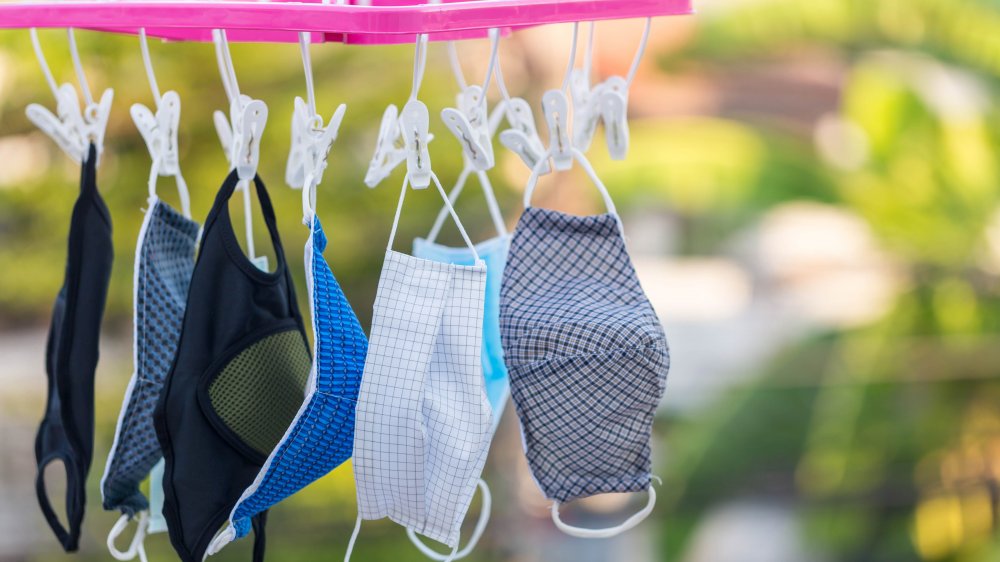Here's Why Your Mask Is Giving You A Sore Throat
If you've been diligent about wearing a face mask in public because of the worldwide coronavirus pandemic, you might feel alarmed to notice a scratchy or sore throat. But don't blame COVID-19 for that, doctors say. Not washing your mask regularly or straining your voice so others can hear you are the more likely culprits (via the Cleveland Clinic).
The Centers for Disease Control and Prevention recommends that people wear masks in public to avoid spreading the coronavirus, especially in areas that don't allow for 6 feet of space between others, such as mass transportation, large gatherings, and grocery stores. Unfortunately, some mask wearers may just toss their mask in the car or their bag where it's handy and forget to wash it later.
That's when a sore throat can appear. The whole concept of wearing a mask in public is to trap germs from when you breathe, cough, or sneeze so that you don't spread them to someone else. But if you wear a dirty mask, it's possible you could wind up inhaling that bacteria, according to Neha Vyas, M.D., a family medicine physician at the Cleveland Clinic.
"[I]t may be from viruses or germs residing in unwashed or unclean masks, either from using them frequently without washing them or taking them on and off with unclean hands," Vyas told the Cleveland Clinic. "Try to limit the number of times that you touch or remove your mask."
Wash a cloth face mask daily to avoid breathing bacteria from when you cough or sneeze
If you're speaking up while wearing a mask so that others can hear you, you might have vocal strain, which is a typical sore throat cause, Vyas added. Other common causes include environmental irritants, dry air, and digestive conditions such as gastroesophageal reflux, or GERD.
Soothe a sore throat with lozenges and over-the-counter aids such as throat spray, an antihistamine, or anti-inflammatory medication such as ibuprofen or acetaminophen, Vyas said. Allergy sufferers, people with weakened immune systems, and those who speak or sing often tend to experience more sore throats, but if yours seem unusually frequent, talk to your doctor.
To reduce any sore throat risk from wearing a mask, wash your hands before and after putting your mask on, as well as after removing it. You can store a face mask temporarily in a paper or mesh bag — for instance, if you're removing it to eat or drink outside your home — but put it on with the same side facing out, the CDC says. Then wash it at the end of the day (via the CDC).
Wash a cloth mask at least daily; throw away a disposable mask after wearing it once, the CDC says. Clean your mask by tossing it in the washing machine with your regular laundry, or hand-wash it using tap water and laundry detergent or soap, then rinse thoroughly. Depending on the fabric, dry your mask completely in the dryer or hang it to dry.


